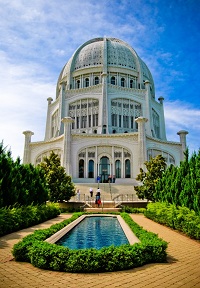You are here: Home>Articles> Baha’i Faith: Multiple Instances Where Baha’u’llah and Abdu’l-Baha Allowed Their Hands and Feet To Be Kissed Although They Had Prohibited It
Baha’u’llah writes in the book of Aqdas:
"The kissing of hands hath been forbidden in the Book. This practice is prohibited by God, the Lord of glory and command."
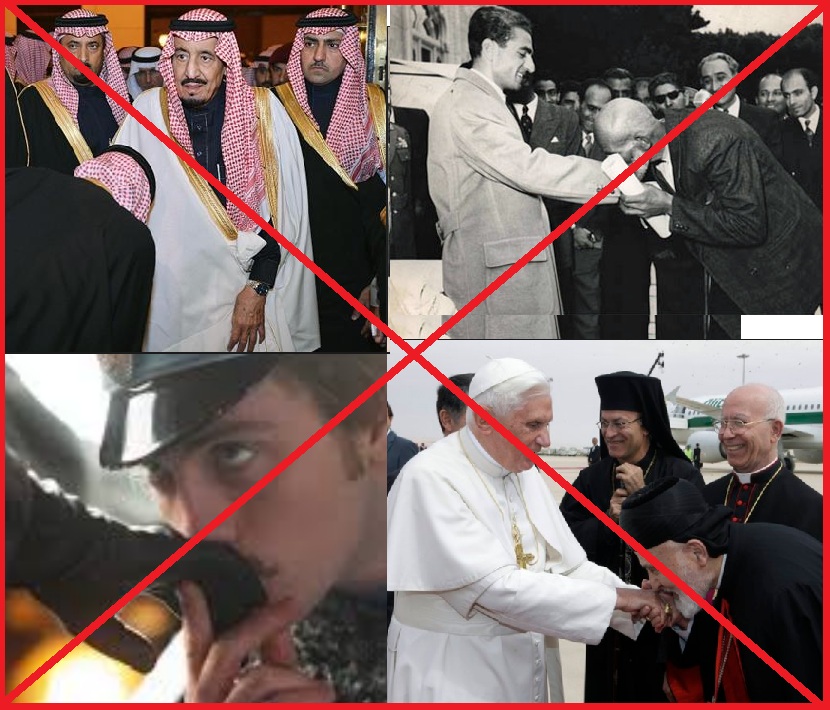
Contrary to his own laws, Baha’u’llah and his son Abdu’l-Baha allowed multiple people, Baha’i and non-Baha’i alike, to kiss their hands. Here we will present a number of these instances including some instances where the Baha’i leaders allowed their followers to kiss not only their hands but their feet too and prostrate to them. This article is divided into three sections:
1- The Evidence.
2- The Baha’i justification.
3- The Failure the Baha’i justification.
1- The evidence
Fortunately, the evidence available in English Baha’i sources and testimonies of trusted eyewitnesses is so numerous that it makes it unnecessary to translate quotes from Arabic and Persian quotes. But, for the record, translations of some non-English sources have also been mentioned.
First we will mention instances where Baha’u’llah’s hands have been kissed, then Abdu’l-Baha’s, and then the kissing of feet and prostrating. Numerous other instances where the hem of the robe and the ground that these figures stood on were kissed, have been omitted from the article.
a- The Kissing of Baha’u’llah’s hands
Shoghi effendi narrates the following incident:
“The inhabitants of the quarter in which Baha’u’llah had been living, and the neighbors who had gathered to bid Him farewell, came one after the other,” writes an eye-witness, “with the utmost sadness and regret to kiss His hands and the hem of His robe, expressing meanwhile their sorrow at His departure . . .” (Shoghi Effendi, God Passes By, p. 181)
The following is narrated from Abdu’l-Baha:
“There was, however, in ‘Akká a certain Muḥammadan Shaykh, a well-known man with considerable influence, who loved Bahá’u’lláh and was greatly favored by Him. I called this Shaykh and explained the position to him. I said, “You are daring. Go tonight to His Holy Presence, fall on your knees before Him, take hold of His hands and do not let go until He promises to leave the city!” He was an Arab. … He went directly to Bahá’u’lláh and sat down close to His knees. He took hold of the hands of the Blessed Beauty and kissed them and asked: “Why do you not leave the city?” He said: “I am a prisoner.” The shaykh replied: “God forbid! Who has the power to make you a prisoner? You have kept yourself in prison. It was your own will to be imprisoned, and now I beg you to come out and go to the palace. It is beautiful and verdant. The trees are lovely, and the oranges like balls of fire!” As often as the Blessed Beauty said: “I am a prisoner, it cannot be,” the Shaykh took His hands and kissed them. For a whole hour he kept on pleading.” (Esslemont, Bahá’u’lláh and the New Era, p. 36)
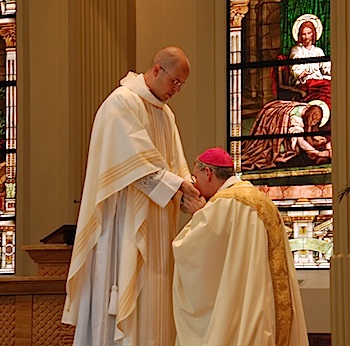
Bahiyyih Khanum states the following:
“The death of this youngest and favourite child - of a very gentle and sweet disposition - nearly broke his mother's heart. We feared for her reason. When the Blessed Perfection was told of the condition of his wife, he went to her and said: 'Your son has been taken by God that His people might be freed. His life was the ransom, and you should rejoice that you had a son so dear to give to the cause of God.' When our mother heard these words she seemed to rally, - knelt, and kissed the Blessed Perfection's hands, and thanked him for what he had said. After that she did not shed a tear.” (Myron Henry Phelps and Bahiyyih Khanum, Life and Teachings of Abbas Effendi, chap. 3)
A trusted Baha’i by the name of Mirza Mirza Habibu’llah Afnan mentions all these instances where he and others kissed Baha’u’llah’s hands:
“I offered Him a cup of tea. The Tongue of Grandeur stated, “Well done!” He drank half of it and gave the rest to me. He also gave me a black rosary made of dark olive-wood that He was carrying. I kissed His hands. That rosary, which has been as dear to me as life itself, is now placed in the Archives of the House of the Bab in Shiraz.” (Mirza Habibu’llah Afnan, Translated by Ahang Rabbani, Memories of the Bab, Baha’u’llah and `Abdu’l-Baha, p. 36)
“He sat down and invited us to sit also. With His blessed Hand, He passed to us the sacred Tablets that He had revealed for each one of us. We reverently kissed His fingers and read the Tablets. They venerated and glorified each one of us.” (Mirza Habibu’llah Afnan, Translated by Ahang Rabbani, Memories of the Bab, Baha’u’llah and `Abdu’l-Baha, p. 47)
“While these ephemeral servants were in `Akka, the Blessed Beauty called our mother and sister into His presence and showered them with much admiration and untold praise. As they were leaving, my mother kissed His blessed hand.” (Mirza Habibu’llah Afnan, Translated by Ahang Rabbani, Memories of the Bab, Baha’u’llah and `Abdu’l-Baha, p. 48)
b- The Kissing of Abdu’l-Baha’s Hands
There is a video from Abdu’l-Baha’s journey to America that clearly shows women kissing his hand:
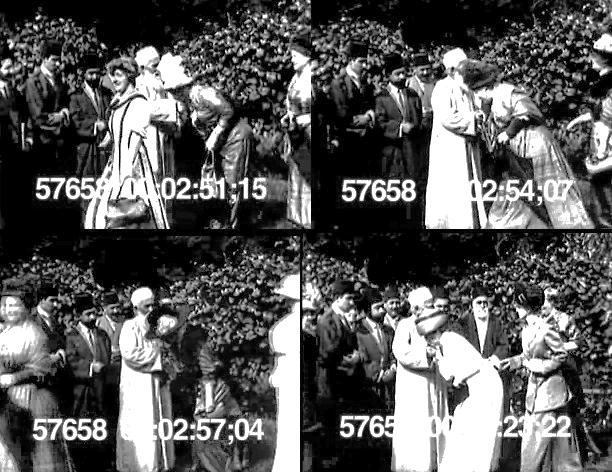
The hand kissing in America attracted so much attention that the title of an article in the newspaper, The Baltimore Sun, November 12 1912 was “Women kiss his hand”. This is how it was described:
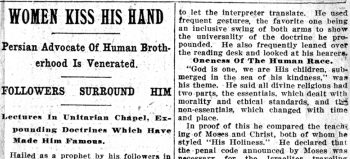
“With condescension, he greeted his followers as they were presented by the interpreter, Dr. Ameer U. Farewed, a Persian and a graduate in medicine of Johns Hopkins University. “Oh, I am so glad to see you,” was uttered in tones of reverence by the women as they bowed before him and kissed his wrinkled hand.”
The following quotes also show Abdu’l-Baha’s hands being kissed multiple times by multiple people:
“The Master came to the table and spoke on the danger of wine and alcohol. He then considered some philosophical subjects and answered questions from the Consul's wife about misconduct and its harmful consequences. She was pleased and when He was about to depart expressed her gratitude by kissing His hand.” (Mahmud’s Diary, p. 175)
“When the Master arrived He was so tired that He went upstairs to rest for a brief time. When He heard the audience's restlessness and impatience, He allowed them to come to Him group by group. They came, kissed His hand and requested His assistance and blessings.” (Mahmud’s Diary, p. 384)
““Except for ‘Abbás Effendi, no one came to my rescue or saw to my needs. How am I to forget this immense kindness?!” From then on, his behavior and attitude completely changed, and whenever he saw ‘Abdu’l-Bahá, he would rush forth and kiss the Master’s hands and express his obedience and servitude.” (Ahang Rabbani, Eight Years Near Abdu'l-Baha: The Diary of Dr. Habib Mu'ayyad, p. 138)
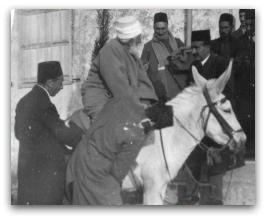
“long the way, wherever we encountered groups of people, men or women, young or old, they would immediately rise to their feet and with great humility, would greet the Master. They would approach Him and kiss His hands with utmost reverence and affection. In this manner, we made our way to Abu Sinan.” (Ahang Rabbani, Eight Years Near Abdu'l-Baha: The Diary of Dr. Habib Mu'ayyad, p. 197)
“Whoever we passed by, would instantly bend low with hands reaching the soil and then bring it over their head, thereby offering the customary expressions of submissiveness, reverence and humility before ‘Abdu’l-Bahá. Children playing in the streets would quit their play and run up to the Master and kiss His hands, and then return to their games.” (Ahang Rabbani, Eight Years Near Abdu'l-Baha: The Diary of Dr. Habib Mu'ayyad, p. 397)
“As she entered, she humbly kissed 'Abdu'l-Bahá's hand. The Master treated her with the utmost consideration and tenderness as she was led to the andaruni of the Master's residence. The dinner-table discussions began next day.” (Youness Afroukhteh, Translated by Riaz Masrour, Memories of Nine Years in Akka, p. 145)
“The sailing date of the ship from Haifa to Beirut was set by this time and it was decided that I should receive my permission to leave the next day. On the day of departure, I again received another series of encouraging and hopeful utterances. As words of prayer for the attraction of blessings and confirmation began to flow from the lips of the Master, I bowed and kissed His hand and the hem of His 'aba. He drew me to Him, placed my head on His chest and conferred upon me His blessing and bounty.” (Youness Afroukhteh, Translated by Riaz Masrour, Memories of Nine Years in Akka, p. 339)
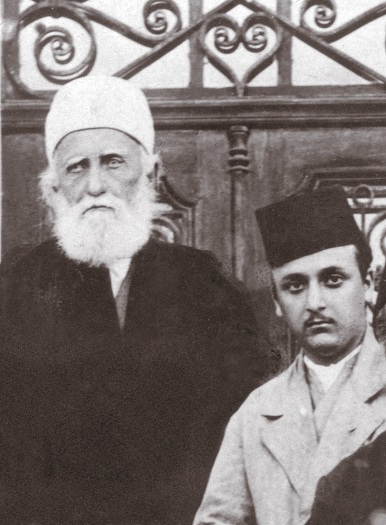
“That night, like the night before, He did not come downstairs. Next morning Mirza Haydar-'ali and I attained His presence. The Master was in a happy mood and so in turn all of us were filled with joy and gladness. Suddenly He said, "Khan, whatever has happened? Come closer and check my pulse." Since whenever 'Abdu'l-Bahá's hand fell into my grasp by chance, I would kiss it as He smiled at me, so this time, too, I jumped at the chance with abandon, took His hand and kissed it three times. Smiling broadly, He said, "My dear man I said check my pulse!"” (Youness Afroukhteh, Translated by Riaz Masrour, Memories of Nine Years in Akka, pp. 409-410)
“On November 1, early in the afternoon, `Abdu'l-Bahá instructed everyone to leave for Abu-Sinan aboard his carriage. En route they were greeted by the locals, who would recognize the carriage and immediately show great humility and respect towards `Abdu'l-Bahá, and approach him and kiss his hands with reverence and affection … Whoever they passed by, that person would instantly bend low, with hands reaching the ground, then bringing them up over the head, thereby offering the customary expressions of submissiveness, reverence and humility. Children playing in the streets would quit playing and run up to him and kiss his hands, and then return to their games.” (Ahang Rabbani, `Abdu'l-Baha in Abu-Sinan: September 1914–May 1915)
“At the conclusion of the address, women kissed His hand and others tearfully greeted Him at the door of the chapel. Pressed by a busy schedule, 'Abdu'l-Bahá and His traveling companions hurried by car to the home of Howard Struven at 1800 N. Bentalou Street for a mid-afternoon meal.” (Allison Vaccaro and Edward E. Bartlett, 'Abdu'l-Bahá in Baltimore)
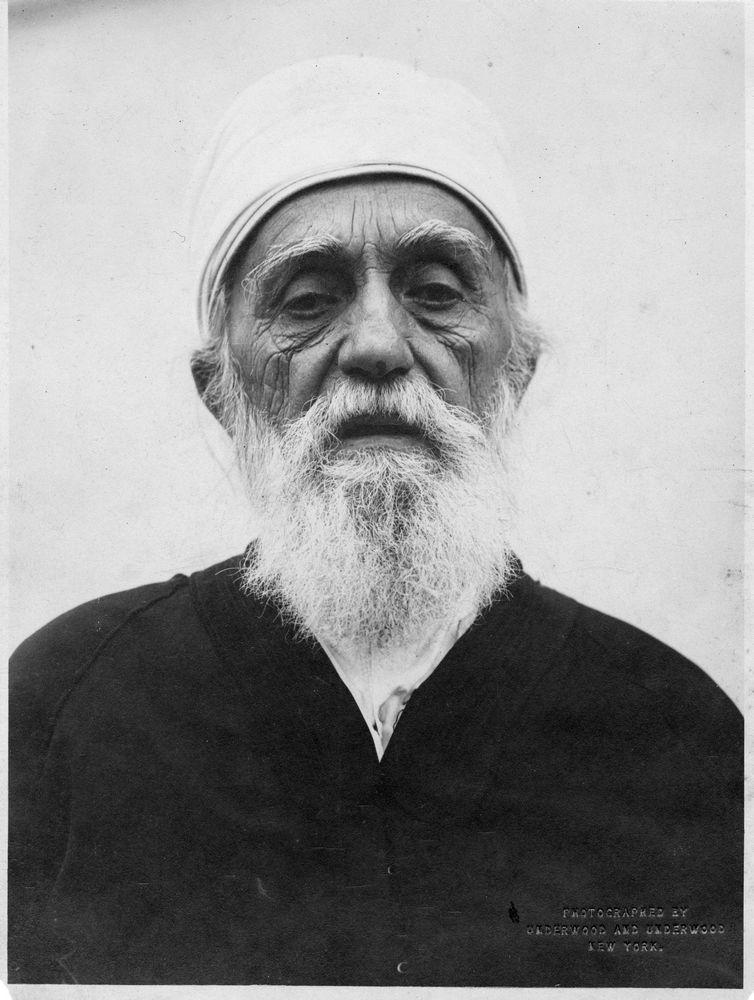
“Thursday, March 23d, our last day at the Holy Household, was a beautiful Day. Early in the morning Rooha Khanum called me and arising hastily I went with her to the room of the “Greatest Leaf,” where the Master was sitting. He bade me welcome as I entered, and I knelt before Him, kissing His hand, and then sat down at His feet beside the “Holy Leaf,” and we drank tea together … He came quickly from the room and, taking me by the hand, led me down one Flight of stairs. And I pressed His hand to my lips, while He turned away and silently kissed Mr. Getsinger-then left us hastily.” (Isaac Adams, Bab and Babism, p. 481)
“The next morning He brought me a most beautiful bunch of white narcissus and allowed me to kiss His blessed hand as He gave them to me. He sat down and drank tea with us, then rose and bade us “adieu,” as we were going back to Haifa that day and He had been called away” (Isaac Adams, Bab and Babism, p. 484)
“Immediately I found myself in the blessed presences, I threw myself on my knees before Him and sobbed aloud from the stress of the various emotions that filled my soul. He gave me His dear hands to kiss (such fine, delicate hands they are!) and patted me tenderly on my cheeks and shoulders, saying in His gentle voice, “La la la marhabba,” “You are welcome, be at ease — be happy… He smiled, patted me again, let me kiss His hands, and then went out, whereupon a sort of general sigh went round, and then all sat down again on cushions and divan.” (Isaac Adams, Bab and Babism, p. 486)
“Mamma, still on her knees, bent and kissed His hand."Tell the Master," she said to Ahmad, "I have always loved Him. Lua knows that.”” (Juliet Thompson and Marzieh Gail, Diary of Juliet Thompson, chap. 4)
“An aged negro who hobbles up, he greets with some kindly inquiry; the old man's broad face breaks into a sunny smile, his white teeth glistening against his ebony skin as he replies. He stops a woman with a babe and fondly strokes the child. As they pass, some kiss his hand. To all he says, "Marhabbah, marhabbah" - "Well done, well done!"” (Myron Henry Phelps and Bahiyyih Khanum, Life and Teachings of Abbas Effendi, chap. 1)
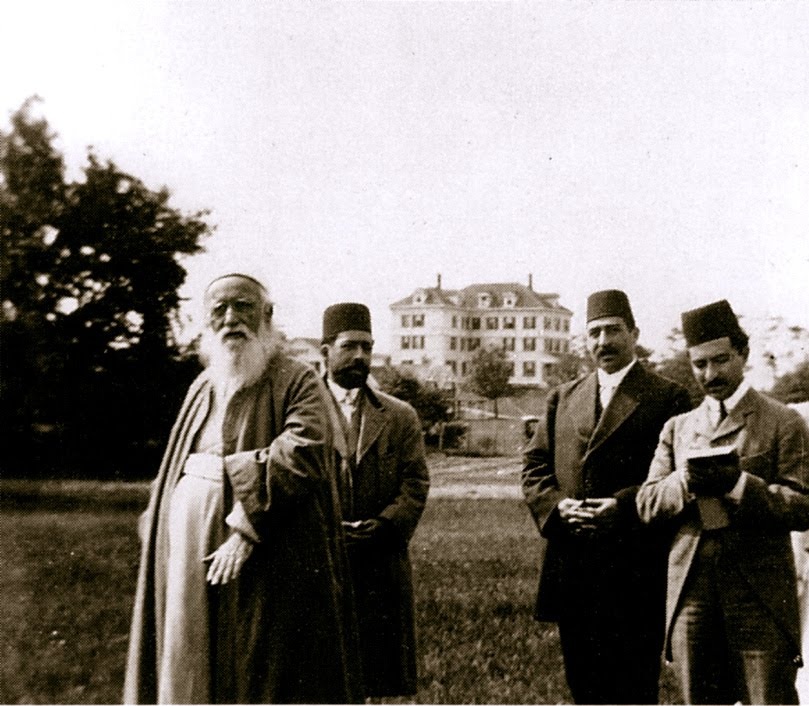
“As the believers came in, ‘Abdu'l-Bahá clasped each one in a loving embrace and gave them their places at the table. Then He passed around the table anointing each one with attar of rose, sometimes upon the cheek, again upon the forehead, or over the heart. Some of the believers kissed His hand or touched His garment in loving appreciation.” (Julia M. Grundy, Ten Days in the Light of Akka, p. 73)
“In a few minutes more the Master himself came into our room and we met him at the door, kissing his hand as he entered. His appearance is absolutely nothing like the picture in America.” (Corinne True and Mirza Hadi, Table Talks and Notes Taken at Acca, p. 17)
We will conclude this section by some quotes from the second volume of Mahmud’s Diary (Bada’i` al-athar) that have not yet been translated to English by Baha’is:
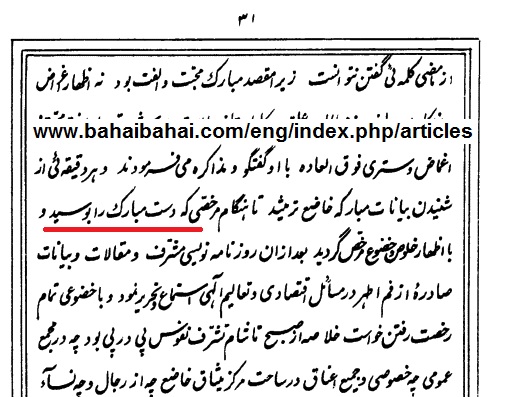
«... با او گفتگو و مذاکره می فرمودند و هر دقیقه ئی از شنیدن بیانات مبارکه (عبدالبهاء) خاضع تر می شد
تا هنگام مرخصی که دست مبارک را بوسید و با اظهار خلوص و خضوع مرخص گردید.»
“He would converse and negotiate with him and would become more humiliated by hearing his blessed sayings by the minute. Until it was time to leave and he kissed (Abdu’l-Baha’s) blessed hand and left while expressing candor and humility,” (Mahmud Zaraqani, Bada’i` al-athar, vol. 2, p. 31)
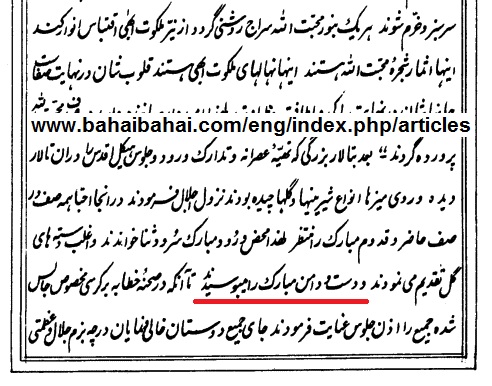
«در آنجا احبا همه صف در صف حاضر و قدوم مبارک را منتظر. لهذا محض ورود مبارک سرود و ثنا خواندند
و اغلب دسته های گل تقدیم می نمودند و دست و دامن مبارک را میبوسیدند.»
“There all the friends had gathered in line and were awaiting his arrival. Thus, once he entered they started singing and uttering praises. Most would hand him bouquets of flowers and would kiss his hand and the hem of his robe,” (Mahmud Zaraqani, Bada’i` al-athar, vol. 2, p. 215)
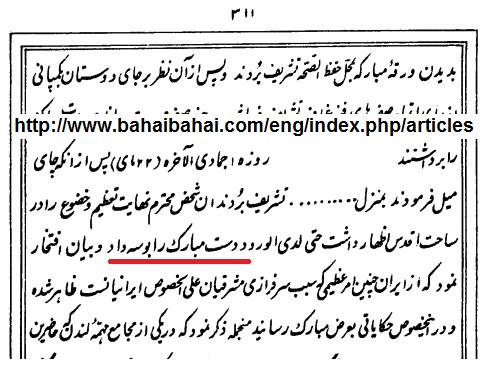
«آن شخص محترم نهایت تعظیم و خضوع را در ساحت اقدس اظهار داشت حتی لدی الورود دست مبارک را بوسه داد و بیان افتخار نمود»
“That respected person showed the utmost reverence and humility in his (Abdu’l-Baha’s) holy presence. He even kissed his hand when he first entered and expressed pride in this matter,” (Mahmud Zaraqani, Bada’i` al-athar, vol. 2, p. 311)
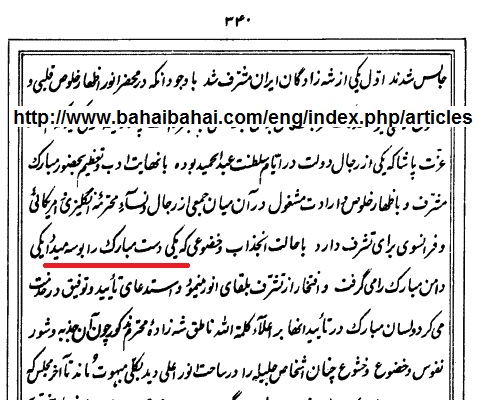
«... در آن میان جمعی از رجال و نساء محترمه ی انگلیزی و امریکائی و فرانسوی ... یکی دست مبارک را بوسه میداد،
یکی دامن مبارک را می گرفت و افتخار از تشرف بلقای انور می نمود.»
“Gathered there were a group of British, American, and French men and women … With great sincerity one would kiss (Abdu’l-Baha’s) blessed hand and another would hold his skirt and express pride for meeting him,” (Mahmud Zaraqani, Bada’i` al-athar, vol. 2, p. 340)
c- Kissing the Feet and Prostrating
Abdu’l-Baha narrates the following about a Babi that was imprisoned with Baha’u’llah:
“Before he left the prison to go to the altar of divine sacrifice, he came first and placed his head on Bahá'u'lláh's feet and kissed them. Having embraced all the friends, he hastened to the plain of sacrifice, dancing and snapping his fingers in ecstasy.” (Mahmud’s Diary, p. 141)
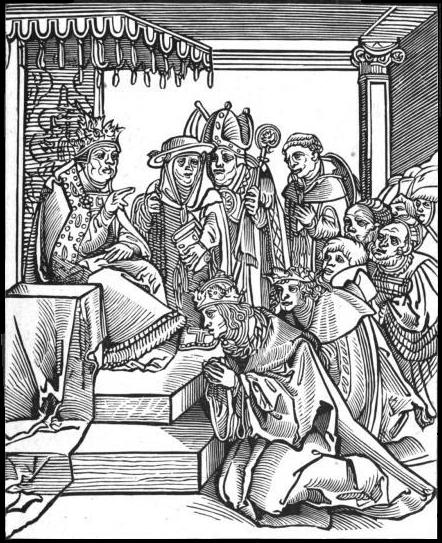
Abdu’l-Baha himself would kiss Baha’u’llah’s feet:
“During the night following the next day, however, my father walked into the house. We hardly knew him; his beard and hair were long and matted - he really was a Dervish in appearance. The meeting between my brother and his father was the most touching and pathetic sight I have ever seen. Abbas Effendi threw himself on the floor before him and kissed and embraced his feet, weeping and crying, 'Why did you leave us, why did you leave us?' while the great uncouth Dervish wept over his boy. The scene carried a weight not to be expressed in words” (Myron Henry Phelps and Bahiyyih Khanum, Life and Teachings of Abbas Effendi, chap. 2)
Many trusted Baha’is have stated that they would prostrate and kiss Baha’u’llah and Abdu’l-Baha’s feet. Habibu’llah Afnan mentions how the Baha’is in acre would prostrate and kiss Baha’u’llah’s feet:
“One morning, before sunrise, an attendant came with the news that the Blessed Perfection was coming to our house. In this way, He placed the crown of everlasting honor upon the heads of these humble servants. The tiding made us weep uncontrollably with joy and we hurried out [to welcome Him]. We saw His blessed Person coming towards our house with great majesty and glory. We all prostrated, kissed His feet and made the earth trodden by His blessed feet the kohl of our eyes.” (Mirza Habibu’llah Afnan, Translated by Ahang Rabbani, Memories of the Bab, Baha’u’llah and `Abdu’l-Baha, p. 36)
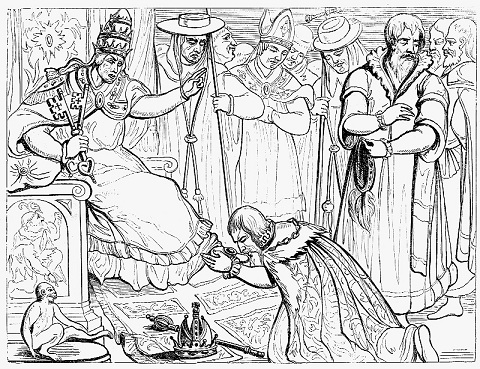
Another Baha’i, Ustád Muhammad-`Alíy-i Salmání, narrates how he would kiss Baha’u’llah’s legs while giving him a bath:
“Water was then brought, and I soaped Bahá'u'lláh's hair two or three times--the various soaps were from Aleppo--and then He withdrew to the place where henna would be applied and the body rubbed with a rough bath mitt. I then brought Him His own bath towel, and once He was dry He stretched out so that I could apply henna to His beard, after which He seated Himself and I used the henna on His hair. He then lay down again (and I placed a pillow under His head) so that I could rub Him with the mitt--and two or three times I kissed His feet. He rose again and seated Himself, and I took the mitt to the backs of His hands and arms.” (Ustád Muhammad-`Alíy-I Salmání, Translated by Marzieh Gail, My Memories Of Bahá'u'lláh, p. 19)
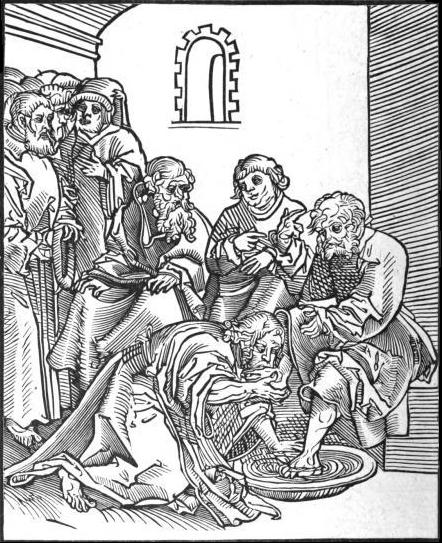

(Traditional Persian Bath)
Khalil Shahidi the custodian of Abdu’l-Baha’s house who was highly trusted by him narrates how his followers used to kiss his feet:
“After the rapscallion Covenant-breakers had left the blessed presence, the friends were summoned, and at that time, each of us reverently, humbly and respectfully, prostrated ourselves on the ground and kissed ‘Abdu’l-Baha’s feet, alighted our eyes and gladdened and thrilled our hearts. That hour was an hour that can never be described by words or otherwise.” (Ahang Rabbani, A Lifetime with Abdu'l-Baha: Reminiscences of Khalil Shahidi, p. 36)
He mentions that covenant-breakers that had repented would also frequently kiss his feet:
“The Covenant-breakers who sincerely would return [to the Faith], and attain the sanctified presence of ‘Abdu’l-Bahá, prostrate themselves at His feet, kissing them, and cry and beg for forgiveness and pardon, ‘Abdu’l-Bahá would say to them, “The past is past,” and envelop them in His kindness and mercy.” (Ahang Rabbani, A Lifetime with Abdu'l-Baha: Reminiscences of Khalil Shahidi, p. 53)
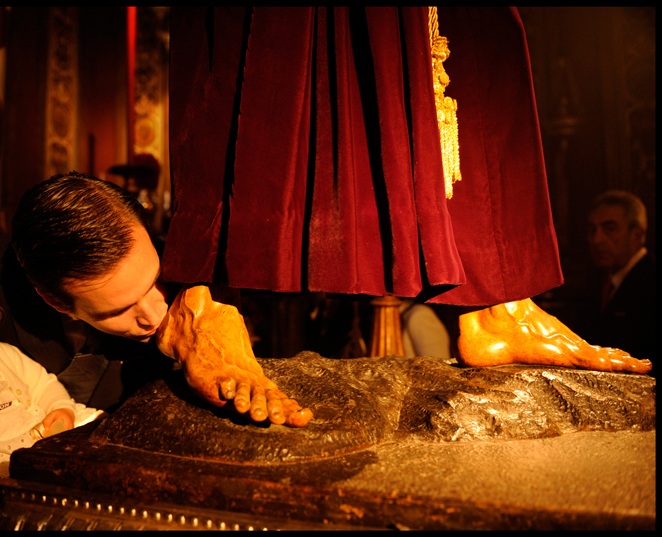
Habibu’llah Afnan utters similar memories:
“I did not sleep the whole of that night. Early in the morning, without telling any of my companions where I was going, I set out directly for His blessed House. En route, on a street corner, I saw His sacred Figure coming towards me. I bowed down and kissed His feet. He raised me from the ground and showered me with His infinite kindness.” (Mirza Habibu’llah Afnan, Translated by Ahang Rabbani, Memories of the Bab, Baha’u’llah and `Abdu’l-Baha, p. 75)
And finally a section from a previously untranslated source:
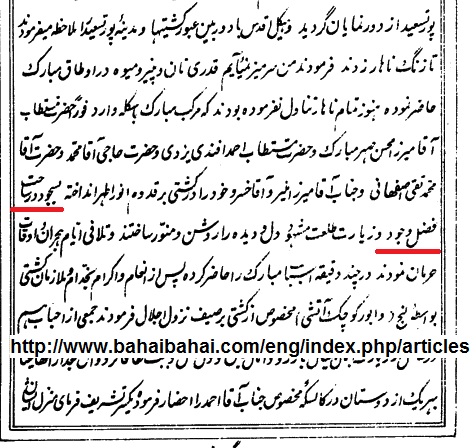
«فورا حضرت مستطاب آقا میرزا محسن همسر مبارک و حضرت مستطاب احمد افندی یزدی و حضرت حاجی آقا محمد
و حضرت آقا محمد تقی اصفهانی وجناب آقا میرزا منیر و آقا خسرو خود را در کشتی بر قدوم انور
اطهر انداختند بسجود بر ساحت فضل وجود و زیارت طلعت مشهود دیده و دل را روشن و منور ساختند.»
“Immediately Aqa Mirza Muhsin, (Abdu’l-Baha’s) blessed wife, Ahmad Effendi Yazdi, Haji Aqa, Aqa Muhammad Taghi Isfahani, Mirza Munir, Aqa Khusro threw themselves on his (Abdu’l-Baha’s) feet on the ship and started prostrating on the presence of his noble being,” (Mahmud Zaraqani, Bada’i` al-athar, vol. 2, p. 354)
Ironically, when similar acts were performed on other people that were disliked by Baha’is, they would refer to the act of kissing the feet as being detestable and would express their disgust:
“Suddenly I noticed that one of the resident friends, out of pure excitement and joy, was kneeling before Mirza Badi'u'llah and kissing his feet. Looking around with pride and self-satisfaction, Badi'u'llah could obviously visualize the Bahá'í world humbled at his feet.” (Youness Afroukhteh, Translated by Riaz Masrour, Memories of Nine Years in Akka, p. 168)
“They adopted a respectful attitude towards Mirza Badi'u'llah, who had now returned to the fold. But he was not content with mere respect; he expected to receive reverence and prostration. He even entertained the thought that the friends should kiss his hands and even his feet, and this expectation disgusted the friends.” (Youness Afroukhteh, Translated by Riaz Masrour, Memories of Nine Years in Akka, p. 171)
2- The Baha’i Justification
Baha’is try to justify these acts by claiming a specific kind of kissing was meant, or the kissing that is equal to submission has been prohibited. They base this justification on a supplementary note provided by the UHJ in the book of Aqdas:
“In a number of earlier religious Dispensations and in certain cultures the kissing of the hand of a religious figure or of a prominent person was expected as a mark of reverence and deference to such persons and as a token of submission to their authority. Bahá’u’lláh prohibits the kissing of hands and, in His Tablets, He also condemns such practices as prostrating oneself before another person and other forms of behavior that abase one individual in relation to another.” (Baha’u’llah, The Kit-i Aqdas, note no. 58)
3- The Failure of the Baha’i justification
a- The aforementioned note by the UHJ is not an authorized interpretation of Baha’u’llah’s words. Under Baha’i law there are only two authorized interpreters of Baha’i scripture: Abdu’l-Baha and Shoghi. Thus in its current form, this note has no validity unless proved using quotes from the authorized Baha’i interpreters, not the UHJ.
b- Shoghi and Abdu’l-Baha have stated nothing regarding the prohibition of kissing hands and have accepted it in its literal form. If Baha’u’llah had intended such a meaning, or Abdu’l-Baha and Shoghi had inferred such an interpretation, they would have stated it, but they never did.
c- All these aside, if we were to scrutiny the justification made by the UHJ, it would quickly become apparent that this justification holds no water when used to compare the instances of hand kissing mentioned in this article. The UHJ claims hand kissing in other cultures was a “mark of reverence and deference to such persons and as a token of submission to their authority.” This is written in a manner that implies this is the reason hand-kissing has been prohibited.
This justification is invalid because as we can see in the many instances of hand and feet kissing mentioned in the article, the kissings were being done for the exact same reason that Baha’is claim it was prohibited: some cases due to reverence and deference and others due to submission to their authority. In fact, in many of the cases those forbidden reasons have been explicitly mentioned as the cause of the kissings, e.g. “We reverently kissed His fingers” (see quotes above).
d- Even if we disregard this fact, the writings of Baha’u’llah elsewhere, make it completely clear that he never had reverence, deference, or submission in mind when prohibiting the kissing of hands. Pay attention to the following statements by Baha’u’llah:
“God is my witness! Had it not been in conflict with that which the Tablets of God have decreed, I would have gladly kissed the hands of whosoever attempted to shed my blood in the path of the Well-Beloved.” (Baha’u’llah, Gleanings from the Writings of Baha’u’llah, p. 102)
“were it not contrary to the Law of God, I would have kissed the hand of My would-be murderer, and would cause him to inherit My earthly goods.” (Shoghi, The Advent of Divine Justice, p. 27)
Kissing the hand of one’s murderer is not a sign of reverence, deference or “submission to their authority,” but Baha’u’llah still prohibits kissing the murderer’s hand based on the law of the Aqdas. This further proves that the Baha’i justification has no credibility.
e- The Baha’i justification further states that “in His Tablets, He also condemns such practices as prostrating oneself before another person.” As we mentioned in the section on kissing the feet, contrary to this prohibition, Baha’is would prostrate and would kiss the feet of both Baha’u’llah and Abdu’l-Baha!
Baha, Baha’i, Bahá'í, Bahá, Baha’i World Center, Bahá'í World Commonwealth, Baha'i World Commonwealth, Baha’ism, Baha’i Cult, Bahá'u'lláh, Baha'u'llah, Bahaullah, Bahji, Epistle to the Son of the Wolf, Ishraqat, Bisharat, Tarazat, Tajállíyat, Kalimat-i-Firdawsíyyih, Lawh-i-Aqdas, Lawh-i-Dunya, Lawh-i-Maqsud, `Abdu'l-bahá, Abdu'l-bahá, Abdu'l-baha, Abha, Abhá, Abhá beauty, Abha beauty, Abhá Kingdom, Abha Kingdom, Adamic cycle, Afnan, Aghsan, Amatu'l-Bahá Ruhiyyih Khanum, Amatu'l-Baha Ruhiyyih Khanum, Ruhiyyih Rabbani, Ancient Beauty, Allah-u-Abha, Alláh-u-Abhá, Asiyih Khanum, Bahiyyih Khanum, the Bab, Báb, Continental Boards of Counsellors, Jamal-i-Abhá, Jamal-i-Abha, Jamal-i-Qadim, Kitáb-i-Aqdas, Kitab-i-Aqdas, kitāb-i Aqdas, Aqdas, Lawh-i-Sultan, Mirza Mihdi, the Most Exalted Leaf, Navvab, Nawwab, The Hidden Words, the Kitab-i-Iqan, The Seven Valleys, The Four Valleys, Tablet of the Holy Mariner, Suriy-i-Muluk, Suriy-i-Ghusn, Tablets of the Divine, Tablet of Ahmad, Tablet of Carmel, Will and Testament of Abdu'l-Baha, World order of Baha’u’llah, Ya Bahá'u'l-Abhá , Ya Baha'u'l-Abha, Arabic Bayan, Farsi Bayan, Persian Bayan, Bayán, Blessed Beauty, Centre of the Covenant, Universal House of Justice, UHJ, Hands of the Cause of God, Covenant of Baha’u’llah, Covenant Breaker, Naqizin, Mason Remey, Cradle of the Faith, Daniels Prophecy, Dawn Breakers, Dawning Place of Revelation, Dayspring of Divine Guidance, Siyah Chal, Dispensation, Divine Plan, Ten Year World Crusade, Sacred Threshold, Baha’i elections, Local Spiritual Assembly, National Spiritual Assembly, Nineteen Day Feast, Baha’i Fireside, Ghusn, Guardianship, Haram-i-Aqdas, Iran Human Rights, Haziratu'l-Quds, Ridwan, Ridvan, The anniversary of the Declaration of the Báb, Ascension of Bahá'u'lláh, Martyrdom of the Báb, Birth of the Báb, Birth of Bahá'u'lláh, Tablet of the Holy Mariner, Maiden of Heaven, Mashriqu'l-Adhkár, Mashriqu'l-Adhkar, Huqúqu'lláh, Huququ'llah, International Baha’i Archives, Tablet of Ishráqát (Splendors), Kalimat-I-Firdawsíyyih (Words of Paradise), King of Glory, Knights Of Bahá'u'lláh, Lesser Peace, Greater Peace, Letters of the Leaving, Huruf-i-Hayy, Manifestation of God, Most Great Prison, Mount Carmel, Haji Mirza Siyyid Muhammad, Shaykh Muhammad-Taqiy-I-Naqafi, Mystery of God, Nine Year Plan, Pen of Glory, Pen of Most high, Progressive Revelation, Purest Branch, Qayyúmu'l-Asmá', Qayyumu'l-Asma, Secret of Divine Civilization, Twin Manifestations, Professor Edward Browne, Baha’i faith, Baha’i cult, Baha’ism, Bahai, Baha’u’llah, Kitab-i-Aqdas, Curse, Subh-i-Azal, Mirza Yahya Subh-I Azal, Hypocrisy, Twelve Baha'i Principles, 12 Baha'i principles, Baha'i teachings, Baha'i Principles, Baha'i beliefs, Baha’i, Baha’u’llah, Abdu’l-Baha, the Bab, Shoghi, Independent Investigation of the Truth, Oneness of the World of Humanity,Religion Must Be the Source of Unity, Religion must be in accord with Science and Reason, Removal of all Prejudice, Spiritual Solution of the Economic Problem, Establishment of the Universal House of Justice, Universal Compulsory Education, Universal Language, Equality of Men and Women, Universal Peace, Humanity Is in Need of the Blessings of the Holy Spirit, Mirza Husayn Ali Nuri, Mirza Hossein Ali Noori, Baha’u’llah, Bahaullah, `Abdu'l-Baha, Abd al-Baha, Shoghi Effendi, Baha’ism, Bahaism, Baha'i, Bahai, Babism, The Bab, The Guardian, Universal House of Justice, UHJ, Comprehensive analysis of the twelve Baha'i principles, Shaykhi, Bayani, Bayan, Azali, Mason Remey, Orthodox Baha'i, Ali Muhammad Bab, Sayyid Kazim Rashti, Ruhi, Edward Browne, Manifestation of God, God Passes By, A Traveler's Narrative, Abdu'l-Baha in London, Bahai World Faith, Foundations of World Unity, Memorial of the Faithful, Paris Talks, Selection from the writings of Abdu'l-Baha, Some answered Questions, Tablet to August Forel, Tablets of Abdu'l-Baha, Tablets of the Divine Plan, The Promulgation of Universal Peace, The Secret of Divine Civilization, The Will and Testament of Abdu'l-baha, Epistle to the Son of the Wolf, Gems of Divine Mysteries, Gleanings from the Writing of Bahaullah, Prayers and Meditations by Bahaullah, Proclamation of Bahaullah, Tablets of Bahaullah Revealed after the kitab Aqdas, The Hidden Words of Bahaullah, The kitab i Iqan, The book of Iqan, Iqan, The Seven Valleys and the Four Valleys, The Summons of the Lord of Hosts, The Tabernacle of Unity, Bahai Prayers A Selection of Prayers Revealed by Bahaullah the Bab and Abdu'l-Baha, Compilation on Bahai Education, Compilation on Peace, Compilation on Women, Compilation on Scholarship, Japan Will Turn Ablaze, Bahaiyyih khanom, Baha'u'llah and New Era, The Dawn Breakers, Arohanui Letters from shoghi Effendi to New Zealand, Bahai Administration, Citadel of Faith, Dawn of a New Day, Directives From the Guardian, God Passes By, High Endeavours Messages to Alaska, Letters from the Guardian to Australia and New Zealand, Message to Canada, Message to the Bahai World 1950-1957, Messages to America, The Advent of Divine Justice, The Light of Divine Guidance, The Promised Day is Come, The World Order of Bahaullah, Unfolding Destiny, Persian Bayan, Arabic Bayan, Selections from the Writing of the Bab, Century of Light, One Common Faith, Statement on Baha'u'llah, The Promise of World Peace, The Prosperity of Humankind, Baha’i cult, Baha’i faith

 Abdu'l-Baha:
Abdu'l-Baha: